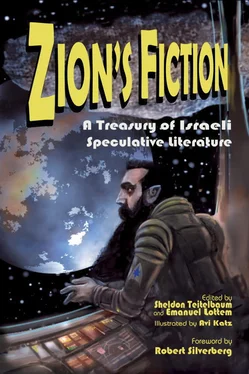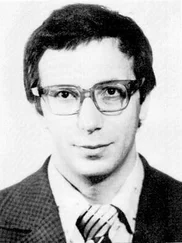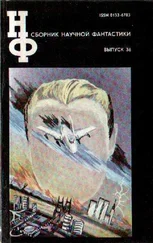“What… was… it… about?”
“I didn’t see the exact details—just a second, I’ll see what I can get. My God! It was about him taking your old you to the past to convince you not to go to war. Would you believe it? Did he really do that? No, of course not. Oh, I see. It makes perfect sense now!
“Ray is a good writer, right?” I know an understatement when I hear one. “He probably waited for you to come back, all these years. He thought about you, he even got a story published about you. He finally did it—he changed the possibilities; he changed your past! That’s some power.”
The time machine, the encounter—they were part of a story? He probably didn’t even realize what he’s he’d done. I certainly hope this doesn’t mean that book burning will become true one day. But I don’t really care. It all makes sense now—my irrational behavior, the killing—it was just a story. I didn’t kill me! I didn’t kill anybody! It’s like the stone has been raised from over my grave, and I can breathe again. I smile, and Sedef smiles back at me, her brilliant smile amplifying mine.
Ray didn’t have to make me kill myself. But I guess that’s just the way he is. I smile again, imagining how I’ll give him a piece of my mind in the next life. There must be one—enough people believe in it. I might have to wait for him a few years, though—he doesn’t seem too willing to let go of this life. I, on the other hand, will soon be looking at new vistas. I hope that heaven isn’t based on the most mundane of human dreams.
I look at Sedef one last time. She takes my hand, and I close my eyes, lose all sensation but her warmth. No more pain, no more queasiness. It seems so right to have her by my side as my consciousness slips slowly away. The warmth becomes sunny, and I’m surrounded by light. A tunnel beckons me. Of the world of my life, I carry only one thing with me; one thing, as if sketched by Lewis Carroll—a smile.
In the Mirror
Rotem Baruchin

On Thursday, Mika, who was my cat, mine and Liron’s, got killed. One of us, we didn’t know who, left her carrier open on the way to the vet, and in one moment Mika busted loose, bolted out of the cage and onto the street. She was run over immediately.
When we got home, Liron headed straight to the sink to do the dishes. There were no dirty dishes in the sink, so she got all the nice dishes from the top shelf and scrubbed them. After that, she went on, working through the bottom shelf, even though the bottom shelf dishes were sparkling clean. She emptied the saltshaker and washed it. She cleaned all the spice jars and the egg tray in the fridge. She washed the dishes for two and a half hours, crying the whole time.
Mika was originally Liron’s cat, not mine. When we moved in together, I adopted her, and Liron used to say that “now she has two mommies.” Mika liked scaring us to death by sneaking into bed between us and by licking our toes during breakfast. She loved toppling glasses from the edge of the table. She loved playing with Liron’s chains until they got completely tangled. She loved being petted behind the ears and scratched under the chin. She loved attention of any kind.
Liron went to the nearby hardware store and came back with the expensive salad serving bowls I wanted to buy last week before she had said, “Danielle, we don’t have three hundred shekels, and we hardly ever eat salad.” It was only when she unpacked them and started washing them with hands already red and wrinkled from water that I realize that I would have to crack the mirror.
The thought made me feel tired. The last time I cracked the mirror was only two years before, and it took me over a week to get over the terrible fatigue. I lay in bed with red eyes, staring at the ceiling, getting up only to go to the bathroom. Fortunately, Liron didn’t see the cuts on my hand. It took her physically carrying me to the doctor’s—I was too weak to walk—and his not finding anything wrong before she could be persuaded that all I needed was some rest.
When night fell, and Liron’s weeping from the den finally died down, I stood in front of the mirror, trying to delay the inevitable while examining the oh-so-smooth spotless surface, the ancient gilded frame, my own familiar reflection.
Liron hated the mirror. She thought it was ugly and old fashioned. I didn’t like it either, for completely different reasons. At first I loved looking at it, especially after cracking it. The first time I did it I was ten years old, after destroying—in a fit of rage—the doll Nana Chana left me, the only thing she gave me other than the mirror. Now, I wouldn’t crack the mirror for something as silly as that. I did it then, and for months after I would sit in front of the mirror holding the doll, enchanted, looking at the other Danielle who put the fragments in a small jug by her bed and would occasionally take them out and touch them. Once, she cut her finger on one of them. When she grew up and would look in the mirror, I would study her reflection, comparing it to my own. Same red hair, same green eyes, but something in the eyes was different, and it wasn’t just that she couldn’t look right back at me.
I stopped watching that Danielle. I had thought she would grow up to be much like me, and it would be boring to look at her. But things turned out differently. She went to a different high school, studied nursing, and married a doctor. A man. I stopped looking at her because I could no longer see myself in her cold eyes when she put her hair up in a tight bun every morning. It bothered me, seeing how different from me she became over such a small thing. I didn’t look much at the others, either, since I had Liron.
Liron, I reminded myself. I’m doing this so Liron won’t be unhappy. I thought about one more minute, gathering my strength. And then I made a fist. I hit the mirror hard, concentrating on Mika, thinking about her fur, white with gray spots, about her quivering whiskers, a soft purr under the blanket. The mirror cracked. The sudden pain in my hand followed the sharp sound of breakage. But the little crack didn’t stay on my side. It faded into the mirror. And then a different Danielle looked at me from the other side. Yet she wasn’t looking at me, but at the small crack in her mirror. Her hand wasn’t bleeding, and there was a confused expression on her face. She was wondering what had happened, I knew, wondering what she is doing there. And then she heard Liron cry louder again from the other room, confusion turned to sorrow, and she left the mirror and went again to hug and comfort and pack.
On my side, Liron had stopped crying, and a small white cat with grey spots stood for a moment in the door, licking herself before making her way to the bed. I looked at her for a long moment, smiling, until Liron appeared in the doorway. I quickly hid my bleeding hand.
“Whatcha doing?” she asked, coming up behind me. She put her arms around my waist and looked at our reflection in the mirror. She didn’t see what I saw on the smooth surface—the empty room, the sounds of crying and begging from the other room, followed by shouts, a door being slammed shut.
“Looking at my pretty girl,” I answered, and turned into her hug, turning my back on the mirror. Liron smiled against my lips. “Flattery won’t get you anywhere. It’s your turn to do the dishes.”
I would spend more time looking before Liron became mine. I was curious to know if the mistakes I fixed, the errors I erased, were justified for me. I looked at them often, as if to make certain, with evil satisfaction, that they were miserable, so that I could be happy. I would look at the Danielle who made the mistake of choosing biology instead of communications as her major in high school, so she never ended up getting close to Shiri Rosenstein, never kissing her on the lawn. She lived with a man and would often look at the mirror to avoid looking at him. He hugged her at night while he slept and she would lie awake, looking at the mirror, and I knew that she couldn’t understand why she wasn’t satisfied. I would look at the Danielle who decided to study gender instead of literature. She was a little plumper than I and lived with an angry woman who’d shout at her. I would look at the Danielle who had refused the job offer at the new publishing house because she was afraid it would be too big a risk. She, like me, met Liron, but Liron left her six months later after yet another fit of rage. She would edit, mostly at nights, sitting bleary-eyed in front of the computer, drinking a lot. I was certain that she would get fired soon.
Читать дальше







